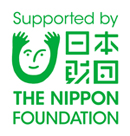
■October 16, 2018: Intrudaction Sir Run Run Shaw
Hospital, Zhejiang University School of Medicine
Profile of the Center for Cerebrospinal Fluid Hypovolemia Treatment of Sir Run Run Shaw
Hospital, Zhejiang University School of Medicine

The Center for Cerebrospinal Fluid Hypovolemia Treatment of Sir Run Run Shaw Hospital
(hereinafter referred to as SRRSH), Zhejiang University School of Medicine, is the earliest instituted medical center for cerebrospinal fluid (CSF) hypovolemia treatment established in China. Dr. He Feifang who is a center figure of the center studied in Japan at Okayama University Medical School in 2006 and established diagnostic criteria for CSF hypovolemia and performed surgery for correction of CSF leakage for the first time in China. Since then, he is the medical doctor who has promoted these treatment strategies.
Dr. He Feifang obtained the Sasagawa Medical Fellowship of the National Hygiene and Health
Commission of China (former Ministry of Health of China) in 2005 and studied at Okayama
University Medical School in 2006, during which he received training in treatment for chronic pain diseases at Okayama University Pain Center and provided treatment by medication and minimally invasive surgery for conditions including cancer, neuropathic pain and diseases including spontaneous CSF leakage. Since coming back to China in 2007, he has filled a void in treatment in this area by taking the lead in performing surgical operations related to spontaneous CSF leakage across China. For a long time, he worked in close coordination with many medical institutes in Japan, the United States and other countries and pain centers in China to put their efforts into the treatment of CSF leakage-related diseases caused by intracranial hypotension as well as into the establishment of “specialty outpatient departments for intracranial hypotension” and “spontaneous
CSF leakage surgery centers,” thereby allowing them to accept, examine and perform operations on patients with spontaneous and secondary CSF leakage nationwide and beyond boundaries.
As there is an inconsistency in etiology, time course of disease progression and characteristics of imaging findings of CSF leakages caused by intracranial hypotension among patients, the doctor has prepared minimally invasive surgery plans suitable for individual patients. So far he has already provided safe and effective minimally invasive surgeries to 800 patients with CSF leakage caused by intracranial hypotension from more than 20 provinces, cities and autonomous districts nationwide,
allowing him to gain a great deal of clinical experience.
In response to receiving multiple invitations from scientific conferences and medical institutes at home and abroad, Dr. He Feifang has given explanations and demonstrations of surgical operations related to CSF hypovolemia. His activities include the following: a poster presentation at the 2012
Asia-Pacific Region of Orofacial Pain, a poster session at the 2015 6th Association of Southeast Asia
Pain Societies Conference (Manila, Philippines), a symposium report at the 2016 Annual Meeting of CSF Hypovolemia Society (Tokyo, Japan), a poster session in the World Congress of Anaesthesiologists (Hong Kong) and a symposium report at the 2017 Annual Meeting of CSF Hypovolemia Society (Saitama, Japan). At the same time, he has worked actively to organize scientific conferences in China to invite internationally prominent scholars and deliver academic lectures. He had Professor Shinichi Ishikawa, chairman of the CSF Hypovolemia Society in Japan,
hold a forum and deliver a lecture at the SRRSH of Zhejiang University School of Medicine in 2016,and had a group comprising Shinichi Ishikawa, chairman of the CSF Hypovolemia Society in Japan,and Nakai, representative of the Association of Supporting Whiplash Injury Patients in Japan, attend a forum and lecture held at the SRRSH of Zhejiang University School of Medicine in 2017, where“China-Japan Cerebrospinal Fluid Hypovolemia Society” was established. Two organizations, the CSF Hypovolemia Society in Japan and the Association of Supporting Whiplash Injury Patients in Japan, placed emphasis on treatment of patients with CSF fluid hypovolemia in China. Ongoing
interactions helped expand the number of associates, which resulted in significant implications in promoting the progress of medical institutions and scientific standards on a global scale regarding
minimally invasive surgeries for treatment of CSF leakage caused by intracranial hypotension.
The Center for Cerebrospinal Fluid Hypovolemia Treatment, the SRRSH of Zhejiang University
School of Medicine, is able to markedly reduce the incidence of nervous system complications,
including compression of the spinal cord, adhesiolysis of the epidural space, hemorrhage and
hematoma formation of the epidural space and intracranial subdural hemorrhage by using every operative procedure, including “intraoperative imaging techniques for epidural space,” “minimally invasive epidural replacement by segmental catheter placement at high levels of the spinal cord,”and “replacement for CSF leakage in an extensive area.”
In China, the age of the Internet and medical care have arrived at high speeds and the CSF leakage surgery center of SRRSH of Zhejiang University School of Medicine is the only leading institution in China for surgeries to address CSF leakage. Until now, most Chinese have not fully understood the CSF fluid hypovolemia caused by intracranial hypotension, thereby leading to many cases of incorrect diagnosis, excessive conservative treatment and postponed surgical operations in clinical
settings. By using every measure, including media in the Hygiene Control Sector, the Internet and medical societies to publicize the superiority of surgical treatment of diseases caused by CSF leakage, the mentality of medical institutions, health personnel and patients will change to understanding and accepting the basis of the surgical and medical treatment. At the same time, the basis of correlated clinical treatment will be established with the aim of promoting the quick recovery of patients with CSF fluid hypovolemia.
October 16, 2018
Translated from Chines into Japanese by Miho Yamamoto
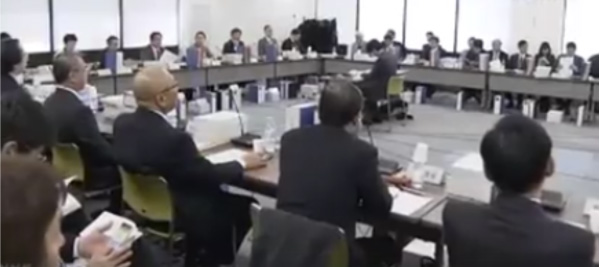
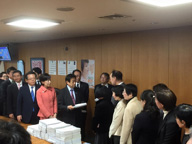
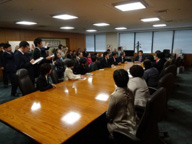
Prefecture: March 26, 2017
Lecturer: Dr Eiji Moriyama Director of the Department of Neurosurgery
Fukuyama Medical center
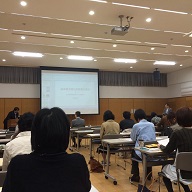
Prefecture: March 22, 2017
Lecturer: Professor Shigeru Nishizawa, Department of neurosurgery, University Of Occupational and Environmental Health
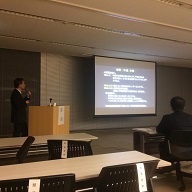
| Chairman of the Society: Shinichi Ishikawa |
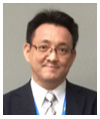 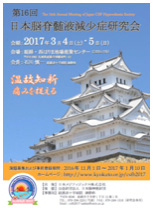
|
| (Chief of Pain Clinic, Anesthesiology, Japanese Red Cross Society Himeji Hospital) | |
Prefecture: March 3, 2017
Lecturer: Doctor Yasuo Ota, Acting Hospital Director, Sumiya Orthopedic Hospital
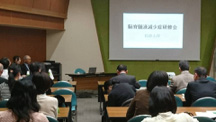
Prefecture: February 25, 2017
Lecturer: Dr Norimistu Nakagawa Director of the Department of Neurosurgery
Meimai chou Hospital
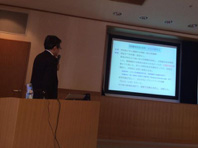
Prefecture: February 12, 2016
Lecturer: Dr Eiji Moriyama Director of the Department of Neurosurgery
Fukuyama Medical center
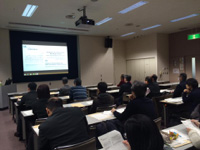
Prefecture: February 9, 2016
Lecturer:Dr Shinichi Goto Chief Anesthesiologist The Japanese Red Cross Society Nagasaki Genbaku Hospital
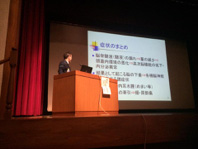
Prefecture: November 6, 2016
Lecturer: Dr Eiji Moriyama Director of the Department of Neurosurgery
Fukuyama Medical center
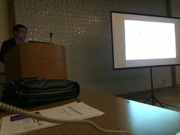
Prefecture: September 3, 2016
Lecturer:Professor Masamichi Shinonaga, Department of neurosurgery, International University of Health and Welfare Atami Hospital
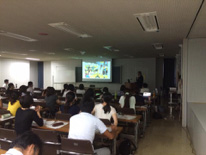
Prefecture: August 7, 2016
Lecturer: Dr Sadahiro Nomura Neurosurgery, Yamaguchi University School of Medicine
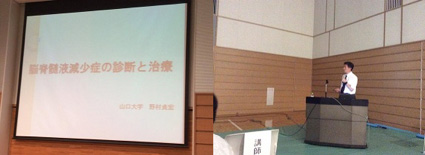
Prefecture: July 24, 2016
Lecturer: Dr Yoshizo Inagaki Professor, Division of Anesthesiology and Critical Care Medicine, Department of Surgery, Tottori University Faculty of Medicine
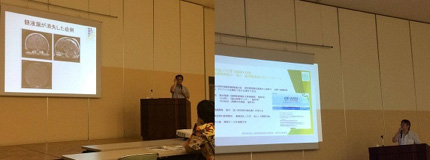
Prefecture: May 27, 2016
Lecturer: Dr Akira Ikeda Acting Hospital Director Cyukyo Hospital
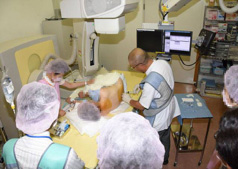
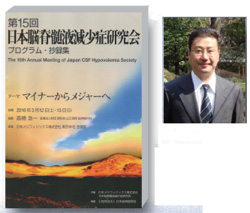
March 16-17, 2016: A total of more than 200 participants Many subjects (Brain surgery, orthopedic surgery, neurology, anesthesiology/pain clinic, ophthalmology and otolaryngology, psychosomatic medicine, urology, and anatomy), etc.

